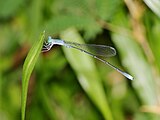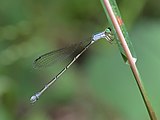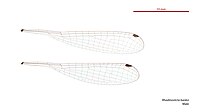Rhadinosticta banksi
Appearance
| Rhadinosticta banksi | |
|---|---|

| |
| Northern wiretail | |
| Scientific classification | |
| Domain: | Eukaryota |
| Kingdom: | Animalia |
| Phylum: | Arthropoda |
| Class: | Insecta |
| Order: | Odonata |
| Suborder: | Zygoptera |
| Family: | Isostictidae |
| Genus: | Rhadinosticta |
| Species: | R. banksi
|
| Binomial name | |
| Rhadinosticta banksi | |

| |
Rhadinosticta banksi is an Australian species of damselfly in the family Isostictidae,[3] commonly known as the northern wiretail.[4]
It prefers fresh water streams and pools. The adult is a small to medium-sized damselfly with a length of 35 to 40mm, with the hindwing 20 to 25mm. They are dull in colour with a bluish thorax and may have pruinescence toward the end of the abdomen. In Australia, the distribution is in suitable habitat from Broome, Western Australia, across the north of the continent to the southern Queensland border.[4] The taxon has been assessed in the IUCN Red List as least concern.[1]
Notes
[edit]The taxonomic difference between Rhadinosticta banksi and Rhadinosticta handschini is uncertain.[3] They may not be separate species.
Gallery
[edit]-
Male in Cairns, Queensland
-
Female, right hand side
-
Female left hand side
-
Female from above
-
Female wings
-
Male wings
References
[edit]Wikimedia Commons has media related to Rhadinosticta banksi.
- ^ a b Hawking, J. (2021). "Rhadinosticta banksi". IUCN Red List of Threatened Species. 2021: e.T163581A174385095. doi:10.2305/IUCN.UK.2021-1.RLTS.T163581A174385095.en. Retrieved 20 November 2021.
- ^ Tillyard, R.J. (1913). "On some new and rare Australian Agrionidae (Odonata)". Proceedings of the Linnean Society of New South Wales. 37 (1912): 404–479 [433]. doi:10.5962/bhl.part.22352 – via Biodiversity Heritage Library.
- ^ a b "Species Rhadinosticta banksi (Tillyard, 1913)". Australian Faunal Directory. Australian Biological Resources Study. 2012. Retrieved 9 April 2017.
- ^ a b Theischinger, G; Hawking, J (2006). The Complete Field Guide to Dragonflies of Australia. Collingwood Vic.: CSIRO Publishing. p. 74. ISBN 978-0-64309-073-6.







